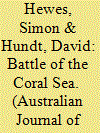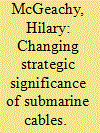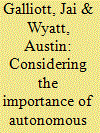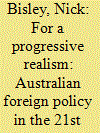|
|
|
Sort Order |
|
|
|
Items / Page
|
|
|
|
|
|
|
| Srl | Item |
| 1 |
ID:
185169


|
|
|
|
|
| Summary/Abstract |
Australia has not been alone in declining the opportunity to take part in China's Belt & Road Initiative (BRI). Instead, this article contends, Australia launched its own infrastructure initiative in the Pacific that has attempted to reduce the attractiveness of the BRI to the region. The article focuses on Australia’s intervention in the Coral Sea Cable System, an action which vastly reduced the role of Chinese firms such as Huawei in building telecommunications infrastructure in the Pacific. Informed by a postcolonial perspective, we explain Australia’s stance on the BRI in terms of its intimate but at-times problematic relations with Asia and the Pacific. This was reflected in Australia’s unwillingness to acknowledge the legitimacy of the BRI as a foreign policy initiative, in its invocation of the ‘rules-based order’ to justify its intervention in the cable project, and in the design of its regional infrastructure program, which bore some uncanny resemblances to what Australian policymakers have depicted as the worst aspects of the BRI itself.
|
|
|
|
|
|
|
|
|
|
|
|
|
|
|
|
| 2 |
ID:
185168


|
|
|
|
|
| Summary/Abstract |
The strategic significance accorded to submarine cables has never been a static concept, but it has been homogenous: a focus on protecting cables from external threats. This article argues that because submarine cables have long had strategic value, they provide a means to examine the emerging concept of strategic technology competition between the United States and China. To do so, this article examines major changes to the submarine cable sector since 2015, including the success of Chinese company Huawei Marine, and US and other western government interventions in several cable projects. It characterises the strategic considerations exhibited by submarine cable activity in that period – influence building in third countries, a changing perception among the US and its partners of threat and protection priorities, and closer attention to cable security and surveillance considerations – and compares them with the traditional strategic values attached to submarine cables. It concludes strategic concerns about undersea cables includes a new concept: the construction and installation of cables as a strategic threat, and which adds complexity to a sector in which it is difficult to project influence. This article seeks to make a contribution to scholarship on strategic competition in emerging technologies.
|
|
|
|
|
|
|
|
|
|
|
|
|
|
|
|
| 3 |
ID:
185171


|
|
|
|
|
| Summary/Abstract |
Despite the growing breadth of research related to the perceived risks and benefits of Autonomous Weapon Systems (AWS), there remains a dearth of research into understanding how perceptions of AWS among military officers are affected by design factors. This paper demonstrates that ease of use, and user perception of the concept of using an autonomous weapon system, would be less of a barrier to trusted deployment by this emerging generation of military leaders than ensuring that autonomous systems have robust, transparent and reliable decision-making processes and that operators or supervisors are able to meaningfully monitor the systems nominally under their command. The core contribution of this paper addresses the question of how deliberate design choices could improve or diminish the capacity of junior officers to exercise meaningful human control over autonomous systems.
|
|
|
|
|
|
|
|
|
|
|
|
|
|
|
|
| 4 |
ID:
185166


|
|
|
|
|
| Summary/Abstract |
In the face of the current proliferation of existential threats-the risk of nuclear war, anthropogenic climate change, COVID-19, and (arguably) disruptive technologies like artificial intelligence-it is imperative that Australia embrace the notion of shared responsibility in international politics. Individual states have limited capacities to effectively tackle such large-scale, complex emergencies on their own. Highlighting the moral implications of the philosophical notion of joint action, this commentary makes the case for a particular type of responsibility, which can only be discharged when states deliberate and coordinate their actions. Moreover, it explores what this notion of shared responsibility means for Australia-and its international relationships-with respect to responding to climate chaos and COVID-19. Even though Australia, acting on its own, can neither significantly mitigate climate change nor halt the current global pandemic, it nevertheless has demanding moral responsibilities to respond to both. This is because the capacities necessary to affect meaningful change can be created through collaboration with other institutional agents. In the absence of intergovernmental organizations able to respond effectively to such crises, Australia has shared responsibilities to contribute to establishing, and then acting as part of, informal, purpose-driven, climate change and COVID-19 ‘coalitions of the obligated’.
|
|
|
|
|
|
|
|
|
|
|
|
|
|
|
|
| 5 |
ID:
185167


|
|
|
|
|
| Summary/Abstract |
What ideas and concepts might be used to reinvigorate a progressive approach to Australian foreign policy? In contrast to the clarity of the international vision provided by right-wing movements, there is uncertainty about the contours of a progressive approach to contemporary Australian foreign policy. This article outlines the basis of a ‘progressive realism’ that can challenge right-wing accounts. Progressive realism combines a ‘realistic’ diagnosis of the key dynamics that underpin contemporary world politics with a ‘progressive’ focus on the redistribution of existing power configurations. Taken together, these two building blocks provide the foundations for a left-of-centre foreign policy agenda. We apply progressive realism to four policy areas: pandemic politics, aid and infrastructure in the Pacific, climate change, and a crisis in the Taiwan Strait. This analysis, in turn, highlights the challenges and opportunities for progressive political actors in crafting foreign policy both within and beyond Australia.
|
|
|
|
|
|
|
|
|
|
|
|
|
|
|
|
| 6 |
ID:
185165


|
|
|
|
|
| Summary/Abstract |
The further isolation of North Korea in response to the Covid-19 pandemic is a timely reminder that when it comes to the question of how to bring about change with relation to North Korea, a combination of creative and differentiated approaches are needed. In this piece, we argue that preparations for a just future transition on the Korean peninsula must start now. This commentary considers the possibilities for Australia to support just transition, in whatever form it may take, through immediate action not focused on bilateral or state-centric relations, but instead through other spaces in a broadly defined civil society. Effective Australian support for transitional justice and overall wellbeing of North Koreans must overcome structural barriers to opportunity for North Koreans within Australia, as well as barriers of overly securitised paradigms.
|
|
|
|
|
|
|
|
|
|
|
|
|
|
|
|
| 7 |
ID:
185170


|
|
|
|
|
| Summary/Abstract |
The Islamic State (ISIS) early became infamous for its broadcasts of extreme violence. However, within months, the group’s initially dominant images of combat and executions had been subsumed into a broader propaganda platform more focused on state-building and community engagement. Drawing on a close reading of Abu Bakr Naji’s Management of Savagery, this article conceptualises three dominant themes within ISIS’ recruitment propaganda—violence, state and caliphate—and analyses their development and presentation over time. Employing a recruitment model adapted from Prochaska and DiClemente’s theory of behavioural change, it finds that ISIS developed a multidimensional propaganda platform, undergoing both broad thematic and structural evolution, which democratised the appeal of its jihad to cohorts who would otherwise be uninspired by extremist violence. ‘Technological coding’—the selective publication of thematic content by broadcast format—is proposed as a means by which ISIS was able to sustain binary violent and non-violent identities, and its function in the group’s propaganda machine is explored in depth. In the wake of ISIS’ territorial defeat, understanding the logic and effectiveness of its recruitment methodology is essential in preventing its resurgence or the rise of a newer organisation seeking to take its place.
|
|
|
|
|
|
|
|
|
|
|
|
|
|
|
|
|
|
|
|
|